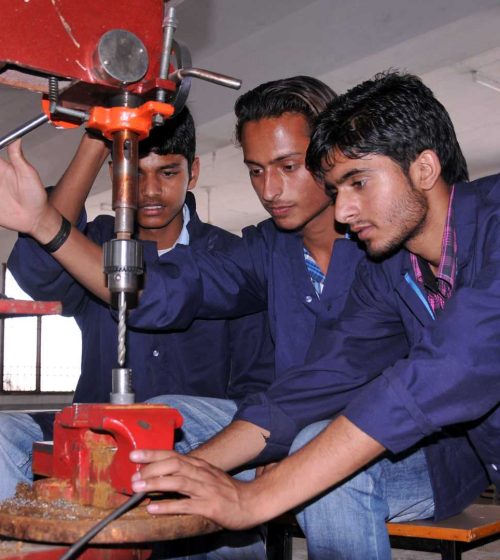MECHANICAL
TIME TO APPLY YOURSELF
It’s time to make a bold move. Become part of the next class of talented, future-focused Hiet students.
Apply Now
Diploma - MECHANICAL ENGINEERING
Mechanical Engineering is one of the oldest and most challenging branches of Engineering. The Diploma course at HIET is equipped to meet the present day technological advances and industrial requirements matching with the global standards. The department emphasizes more on practical applications of engineering concepts in order to make students skilled professionals. Diploma in Mechanical Engineering is a 10th-level Diploma course involving professional specialization in the field of designing. Mechanical Engineering is a field of engineering that involves the application of the standards of Material Science for Investigation, Planning, Assembling, Upkeep of mechanical frameworks. The course is 3-year long in duration, and the minimum eligibility for it is the successful completion of the 10+2 level of education, in Science stream, and from a recognized educational Board.

ABOUT DEPARTMENT
Department of Mechanical Engineering in HIET is as old as the college itself it is a branch of engineering concerned with designing, producing and operating machinery, ranging from relatively simple items to more complex machinery and even entire facilities and plants. The undergraduate program in the Department of Mechanical Engineering prepares students for their individual career paths and fosters the ability to adapt to the rapidly changing technologies faced by today’s engineers. The department is dedicated to the teaching and research activities in the areas of production, design and thermal also in Automobile, Vibration, Energy and Renewable energy and Advanced Machining process. The department educates the students to take up challenging jobs in a wide range of industries and engage themselves in research and development activities for the good of society.

CAREER OPPORTUNITIES
The statistical content of a mechanical engineering course opens up a wide range of opportunities in the private as well as government sectors. Some job options are listed below: Automobile Engineer, Mechanical Engineer, Aerospace Engineering, Industrial Engineer, Production Engineer, Quality Engineer, Maintenance Engineer, Designer Engineer, Designing Engineer, and Operational Engineer.
PROGRAM OVERVIEW
WHAT IS IT ABOUT
Mechanical engineering is one of the main engineering disciplines that include the application of laws of physics for Design, Analysis and Manufacturing of mechanical systems. Students enrolled to the course are taught to make and collect motors and structures, control plants and vehicles of all sizes, understand concepts central to the discipline, such as: Mechanics, Kinematics, Fluid Mechanics, Energy and vitality.

FLUID MECHANICS
Fluid mechanics is the branch of physics concerned with the study of all fluids in both static and dynamic situations. Fluid mechanics can be divided into fluid statics, the study of fluids at rest; and fluid dynamics, the study of the effect of forces on the movement of fluids. This field of study deals with a wide range of issues such as surface tension, statics of liquids, flow in closed bodies or around bodies (solid or not), flow stability, etc. It is important to understand the active principles and properties of liquid movements from a technical point of view.

MANUFACTURING TECHNOLOGY LAB
Manufacturing Technology Lab allows students to learn and practice various machining operations that can be performed on a lathe, molding, drilling, milling, etc. and provides the students with the practical knowledge that is required in manufacturing companies. This lab helps students learn and practice basic machining operations on specialty machines and their applicability to real-time component manufacturing industries.

IC ENGINE LAB
The aim of this laboratory is to carry out research in the area of internal combustion engines with an objective of increasing fuel efficiency, emission control and engine durability and new technology development. In this lab we are study about the Internal combustion engine, as they are used in vehicles, boats, ships, airplanes, and trains. They are named as such because the fuel is ignited in order to do work inside the engine. The same fuel and air mixture is then emitted as exhaust.
MECHANICAL SUBJECT PLANS
1st Year
| Courses | Type | Marks | CODE |
| Courses | Type | Marks | CODE |
2nd Year
| Courses | Type | Marks | CODE |
| Courses | Type | Marks | CODE |
3rd Year
| Courses | Type | Marks | CODE |
| Courses | Type | Marks | CODE |

